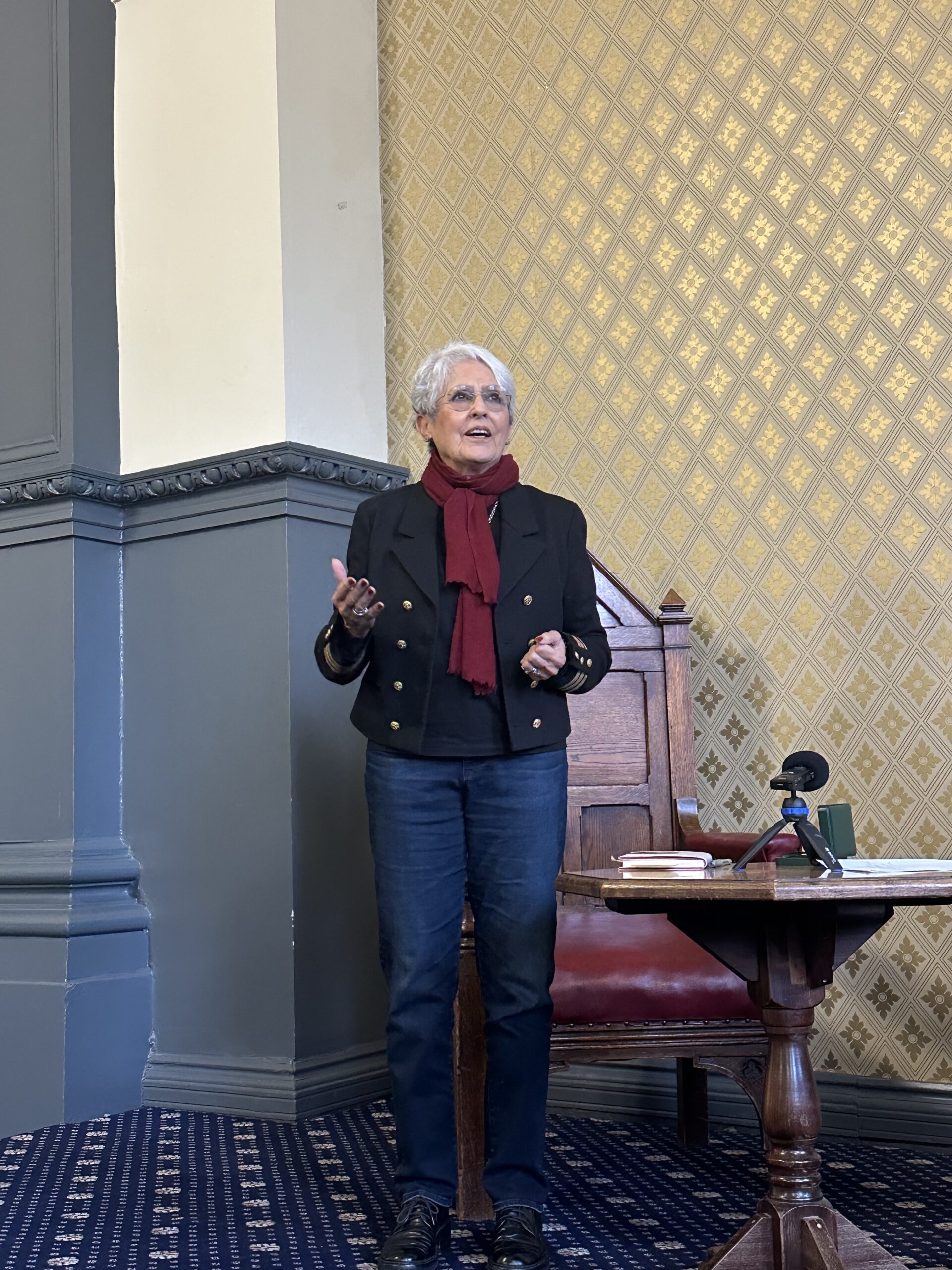
Joan Baez received a gold medal for her outstanding contributions in art and public discourse, the highest honour awarded, from the Historical society on Friday, December the 13th. Baez, who rose to fame in the 60s, has become a legend in folk music and has advocated for nonviolence and human rights throughout her long and illustrious career.
Baez was first introduced and awarded the medal for her work in activism and art before sitting down for a Q&A session with the Auditor of the Hist, Tom Francis. Francis asked Baez questions about the intersection between music and activism and the particular current state of the world. Of activism and social change, Baez stated, “I wouldn’t be interested in it without the music. I believe that it’s the spirit and it’s really the only thing that crosses borders”. When asked about how to move forward in a world she described as a “rise of facism, it’s a total diminishment of empathy and compassion”, she explained, “it’s going to be up to us”. To get through it, she suggested, “I think we should all live 90% of the time in denial, otherwise you just go crazy. And take the other 10% and do what my friend John Lewis said, ‘make some good trouble’.”
The importance of being willing to take a risk was also at the forefront of Baez’s advice. She explained that in the 60s and 70s, “Back in the 60s and 70s when we had each other, we felt we could overcome”. Now, she said, it has to be about looking at overcoming as one step at a time and finding the thing that calls to you. One thing in particular for Baez, is global warming as she explained that she feels a strong kinship for animals, especially the birds.
When Francis asked Baez about how it must’ve felt to have been present and to have sung at the March on Washington in 1963, Baez stated the main feeling was “Gratitude”. Gratitude for being “at the right place at the right time, good direction from my family, and the people around me”. Baez sang ‘We Shall Overcome’ for over 250,000 people that August day in support of racial equality. Her voice was also heard at other pivotal moments for human rights such as Woodstock in 1969, advocating against the war in Vietnam.
Baez additionally shared fascinating information about her background and about what has contributed to her devotion to activism. Among such was the fact that she grew up Quaker. She shared that this in particular has lended itself to her work in nonviolence as silence is such an immense part of being a Quaker. Baez explained, “this world gets louder and louder”, and for her, meditation “ just means to shut up”. She also shared what one of her Buddhist teachers told her, saying “your job is to get your rear end in that pillow. If that’s as far as you get then you’ve got your mediation and then you try to be quiet”. As well as this, she stated that she believes Quakerism has kept her on the right path, “a path more true to myself than the commercial path”.
Questions about her process came up multiple times throughout the award ceremony to which Baez answered, “most of it just comes, just kind of arrives from somewhere underneath and my job is to just get on the page”. She stated that she was “given an overdose of talent” and that she “came out of her mother on output and never quit”. She also shared that she had undergone years of recovery work from early childhood trauma and during that time she discovered she had multiple personalities and that there was a lot of creativity coming from the different parts. Baez explained that these different sides of herself were doing different parts of creating. She stated, “it isn’t what time in the morning I work or I work in the afternoon, it was just that when the inspiration came to paint or draw or do upside down drawing or do poetry, all of it helped me live my life and survive and enjoy myself”.
Due to her nature as a seminal figure of nonviolence and activism, it seemed the audience was desperate for some sort of advice in light of today’s precarious political and social state. She described her mindset as “little victories, big defeats”. Baez acknowledged that right now we are in a “big defeat”, and because of that, right now, it must be little victories that we hang onto. For those in the United States, she advised, taking a deep breath and regrouping so strength can be found for future resistance.
Baez ended the session by singing ‘Ain’t Gonna Let Nobody Turn Me Around’, bringing chills to the skin and tears to the eyes of many in the chamber. Beautifully eloquent and strikingly funny, Baez demonstrated all of the finest qualities the Hist desires to highlight in their awards, making Baez the perfect recipient of the gold medal for contributions in art and public discourse.






